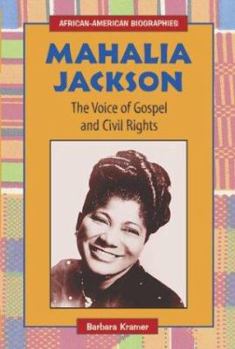Mahalia Jackson: The Voice of Gospel and Civil Rights
Select Format
Select Condition 
Book Overview
Designed for the middle school and high school reader, this series spotlights inspirational African Americans both contemporary and historical. Exploring the personal and professional accomplishments... This description may be from another edition of this product.
Format:Library Binding
Language:English
ISBN:0766021157
ISBN13:9780766021150
Release Date:January 2003
Publisher:Enslow Publishing
Length:128 Pages
Weight:0.85 lbs.
Dimensions:0.5" x 6.0" x 9.0"
Age Range:11 to 17 years
Grade Range:Grades 6 to 12
Related Subjects
Biographies Children's Children's Books Multicultural Musical Performing Arts Social ActivistsCustomer Reviews
1 rating
Leaving New Orleans - to come back one day ...
Published by Thriftbooks.com User , 18 years ago
Everything had started very Spartan for Mahalia Jackson (1911-1972), in New Orleans: She had to scavenge coal from the railroad tracks or collect wood from the river bank after the early death of her mother for the family of her strict aunt Duke. New Orleans had many shade sides for Mahalia: She hated the rigorous racial segregation. And she hated "Mardi Gras": Using carnival rites, hiding their identities behind their masks criminals killed. (The son of her aunt died at such a "Mardi Gras" event.) She therefore used the chance 1927, aged 16, and accompanied another sister (Hannah) of her deceased mother to Chicago. Somebody named Louis Armstrong had made up his mind similarly at that time. She got in the north of the USA the opportunity to join a quartet - soon after her voice had jealously been classified as too striking in the church choir. At first she had a hard row to hoe with a minister, who did not like her hand clapping and did not tolerate her rhythmical body movements. He furiously recommended her the return to the south. She stayed in Chicago, succeeded with her style, but it still should last long until she could drive a lavender-colored Cadillac, could buy a seven-room house in a white neighborhood, guarded by police. At least she had success. She celebrated her annual appearances in the New York Carnegie Hall or in radio shows, was praised by Martin Luther King or sang for president Eisenhower (in the 1950s) or for the inaugural at of John F. Kennedy (in the 1960s). She sang for the civil rights March on Washington or met Indira Gandhi. When she appeared (for a recording session) on the occasion of a symposium of music professors in Lenox, Massachusetts, she afterwards was assigned to sleep in a converted stable. When she woke up in her horse stall early in the morning, she heard tape recordings of her own voice floating out of the splendid villa windows. She felt very angry. She would never forget this situation. And she never has forgotten her very beginning: In New Orleans she had heard the voice of Enrico Caruso out of the windows of white neighborhoods. And she listened to the voice of Bessie Smith, coming out of the windows in black neighborhoods. A mixture of it became her own unmistakable style. Moreover, her musical heart had been set on fire at the funeral rites in New Orleans - particularly at the happier pieces following the respective burial. The blues made her too sad, she said. She disapproved by the way, that the honor of a traditional, street party like New Orleans funeral never was granted to a woman. Therefore she wrote the song "Jesus met the woman at the well". In January 1972 Mahalia was treated to a traditional New Orleans funeral. She liked bands, playing slow dirges, following a coffin drawn by white horses...




